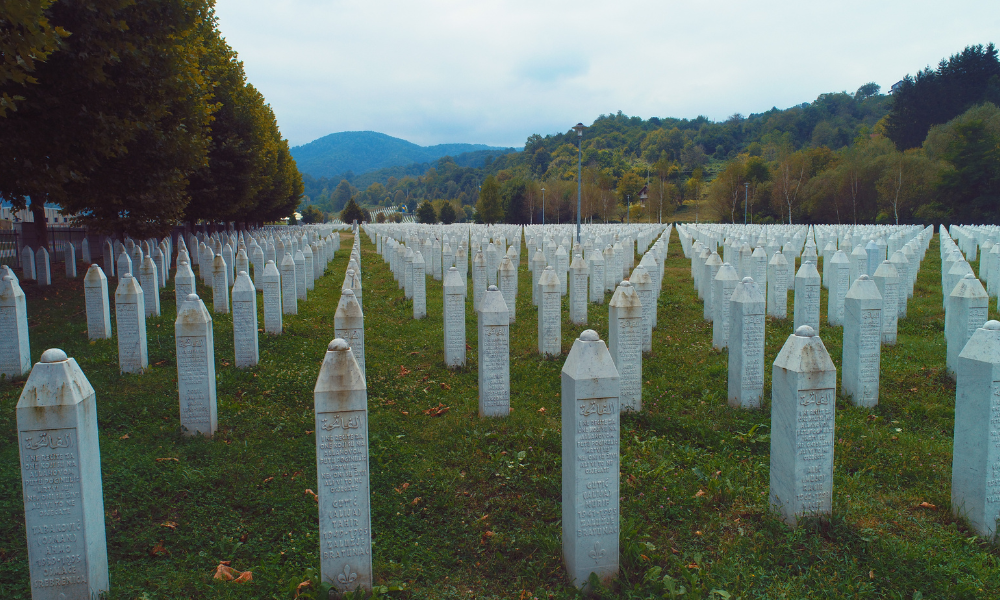
Recalling 'history of past crimes can help prevent such atrocities from happening': IBA president

The International Bar Association (IBA) has highlighted the importance of international justice and accountability as it marked July 11 as the International Day of Reflection and Commemoration of the 1995 Genocide in Srebrenica, as designated by the United Nations.
“I studied in the former Yugoslavia for three years during the mid-1980s and then worked there during and after the war,” said Mark Ellis, IBA executive director, in a press release. “The Srebrenica massacre was one of the darkest chapters in modern European history and was pivotal in the development of modern-day international justice.”
“It can be said that remembering the history of past crimes can help prevent such atrocities from happening in the future, so having commemorative and reflective days like these are important,” said Jaime Carey, IBA president, in the press release.
In its press release, the IBA noted that several threats to humanity, the rule of law, and compliance with international humanitarian and human rights law have continued in the 21st century.
“Our focus in the IBA is always the rule of law and the defence of judicial independence,” Carey said. “The genocide in Srebrenica is a sombre example of a criminal act that eventually resulted in those responsible being tried and convicted under the due process of law.”
“On this day, special attention should be placed on the survivors, particularly the Mothers of Srebrenica, who have steadfastly advocated for accountability and remembrance, honouring the memory of those who died,” Ellis added.
In its press release, the IBA said the world continues to experience the impacts of the Srebrenica genocide and ethnic cleansing. The IBA called attention to the recent creation of the Special Tribunal for the Crime of Aggression against Ukraine via the signing of an agreement by the Council of Europe and Ukraine on June 25.
In its press release, the IBA explained the events leading to the 30th anniversary of the Srebrenica genocide. About three decades ago, in July 1995, General Ratko Mladić led Bosnian Serb forces to gather, kill, and bury around 8,000 men and boys in mass graves in Srebrenica, eastern Bosnia. The IBA noted that most casualties were Bosniaks, or Bosnian Muslims.
The IBA noted that the UN had declared the location a “safe area” under its protection in April 1993. Despite this designation, Bosnian Serb forces took over the area, the slayings occurred, and tens of thousands of residents had to leave their homes.
Launched in 1993, the International Criminal Tribunal for the former Yugoslavia (ICTY) aimed to respond to conflicts in the Balkans in the 1990s, tackle serious international humanitarian legal breaches, and prosecute those responsible for war crimes, crimes against humanity, and genocide during Yugoslavia’s breakup.
The IBA called the ICTY’s creation an important step toward affirming international law and fighting against impunity among war criminals.
Following nearly 20 years of hiding, Mladić faced the ICTY in The Hague and received charges of murder, persecution, forcible transfer, and war crimes. He received a guilty verdict and a life imprisonment sentence, served in the Netherlands.
In 2004, the ICTY declared the Srebrenica killings genocide. In 2007, the International Court of Justice (ICJ) confirmed this declaration. The IBA noted that the ICTY and ICJ worked together under the UN’s mechanisms to obtain justice for the victims.
In its press release, the IBA said some among the Serbian population continue to minimize, deny, or justify the July 1995 occurrences, even given the evidence and the international tribunals’ findings that the slayings amounted to genocide.
According to the IBA, in response to these denials, the UN General Assembly decided last year to dub July 11 a day to commemorate, speak up about, and denounce those war crimes.